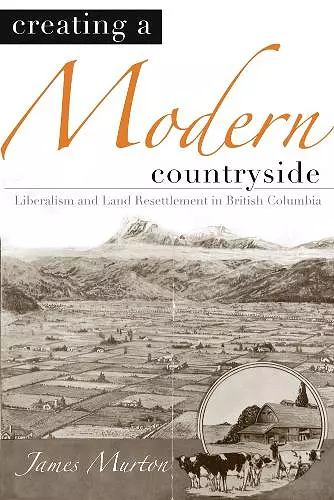Creating a Modern Countryside
Liberalism and Land Resettlement in British Columbia
Format:Hardback
Publisher:University of British Columbia Press
Published:30th Jun '07
Currently unavailable, and unfortunately no date known when it will be back

Exceptionally well-written. This book makes a very significant contribution to environmental history, BC history, and intellectual history. -- Barry Ferguson, author of Remaking Liberalism
In the early 1900s, British Columbia embarked on a brief but intense effort, with long consequences, to manufacture a modern countryside. For the first time, the state directly intervened in planning and implementing land settlement. This work examines how this process unfolded and assesses its consequences.
In the early 1900s, British Columbia embarked on a brief but intense effort to manufacture a modern countryside. The government wished to reward veterans of the Great War with new lives: soliders and other settlers would benefit from living in a rural community, considered a more healthy and moral alternative to urban life. But the fundamental reason for the land resettlement project was the rise of progressive or “new liberal” thinking, as reformers advocated an expanded role for the state in guaranteeing the prosperity and economic security of its citizens.
This ideological shift pushed the government to intervene directly in the management of not only society but also the natural environment. As most arable, accessible land in British Columbia was already being farmed by 1919, the state had to undertake environmental engineering projects on a scale not yet attempted in the province. Creating a Modern Countryside examines how this process unfolded, identifies its successes and failures, and demonstrates how the human-environment relationship of the early twentieth century shaped the province as it is today.
Murton’s main contrubution to environmental history is his analysis of state formation whithin a region, an order that depended upon establishing a new and more direct relationship with the land. Creating a Modern Countryside opens up the possibility for an exploration of the intersection between state organization, landscape ideology, and culture in British Columbia ... As a recent addition to the Nature/ History/ Society series published by UBC Press and edited by Graeme Wynn, it fits well the aim to publish high quality, lively, innovative scholarship on the interaction of people and nature through time in North America ... It challenges us to think about how our constructions of the past need to be informed by an understanding of the environment. It is a good example of how environmental historians might 'get outside and into the dirt.'
-- Bruce Shelvey * Environmental History Journal, Volume 12, Number 4 *In Creating a Modern Countryside, historian James Murton addresses British Columbia’s distinctive attempts to promote in tandem particular ways of life and particular methods of land use. Through a case study approach to interwar land resettlement programs, Murton illustrates how “changes in the state and changes in the land were inextricably linked.”
Murton’s study exposes the complex entanglements of nature and the provincial state in a landscape that, for all Tourism British Columbia’s efforts to promote the availability of beauty and pleasure, was not always amenable to human designs.
Murton’s volume is an impressive contribution to the burgeoning subfield of Canadian environmental history, as well as an engagement with themes such as high modernism that are of importance to the international field of environmental history. And given its close engagement with liberalism, a topic of concern to Canadian historians at large, Creating a Modern Countryside is also one of the most compelling illustrations to date of why Canadian historians cannot afford to ignore the work of their environmental history colleagues.
As he details efforts at the creation of a modern countryside, Murton also provides valuable insight into the new liberal mindset, which has remained largely unexplored....
Murton promotes an expansive view of the field of environmental history, one in which the focus is not solely or necessarily on the most blatantly environmental human activities....
In addition to a penetrating analysis of new liberalism at work in interwar British Columbia, then, Murton’s work is also an example of the sort of environmental history analysis that might be possible for other ideological perspectives or, to use his terminology, general logics.
...the book offers a vivid rendering of new liberalism in interwar British Columbia, an important contribution to key themes in the fields of Canadian and environmental history, and a compelling illustration of how these fields might benefit through greater recognition of their overlapping concerns....
-- Shannon Stunden Bower * H-Cana- Winner of K.D. Srivastava Award 2007 (Canada)
ISBN: 9780774813372
Dimensions: unknown
Weight: 560g
280 pages